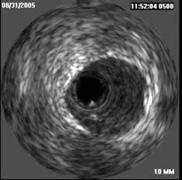
September 8. 2010 – Intravascular ultrasound (IVUS)-guided bifurcation stenting significantly reduced the four-year mortality in patients as compared to conventional angiographically guided stenting, according to a recent study.
The study, supported in part by the Cardiovascular Research Foundation, was conducted in Seoul, South Korea and published in the Sept. 1 issue of the American Journal of Cardiology (volume 106, issue 5 , pages 612-618, Sept. 1, 2010).
In addition, researchers found IVUS guidance reduced the development of very late stent thrombosis in patients receiving drug-eluting stents (DES).
Stenting for bifurcation lesions is challenging and the effect of IVUS guidance on long-term outcomes has not been evaluated. Researchers assessed the long-term outcomes of IVUS-guided stenting in bifurcation lesions in 758 patients with de novo nonleft main coronary bifurcation lesions. They compared adverse outcomes (i.e., death, stent thrombosis, and target lesion revascularization) within four years, after adjustment using a multivariate Cox proportional hazard model and propensity scoring.
IVUS-guided stenting significantly reduced the long-term all-cause mortality in the total population and in the patients receiving DESs, but not in the patients receiving bare metal stents. IVUS-guided stenting had no effect on the rate of stent thrombosis or target lesion revascularization. In patients receiving DESs, however, IVUS guidance reduced the development of very late stent thrombosis (0.4 vs. 2.8 percent).
For more information: www.ajconline.org


 January 05, 2026
January 05, 2026 









